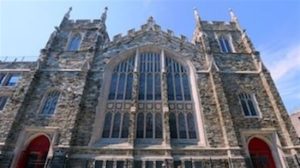
Abyssinian (1932)
On this date in 1808, we celebrate the founding of the Abyssinian Baptist Church in New York City.
19th-century African Americans and a group of Ethiopian merchants were unwilling to accept racially segregated seating at the First Baptist Church of New York City and withdrew their membership forever. Determined to organize their church, they established themselves in a building on Anthony Street (later Worth Street) in Harlem, called the Abyssinian Baptist Church. The name was inspired by the nation from which the merchants of Ethiopia had come, Abyssinia.
The Reverend Thomas Paul, a minister from Boston, assisted the new congregation in organizing as the First African American Baptist Church in New York. In 1856, the Rev. William Spellman began to serve as its pastor. During his tenure from 1856 to 1885, membership increased to 1,600, and funds were used to purchase a church building on Waverly Place. Following Spellman's retirement, the Rev. Robert D. Wynn of Norwich, Connecticut, assumed the role of serving the church. For 16 years, he led a congregation that continued to grow in numbers and achieve greater financial stability. Shortly after the turn of the century, the Rev. Dr. Charles Satchell Morris, who later became a missionary to South Africa, succeeded Robert Wynn as its minister. From 1902 until his health failed in 1908, Morris led brilliantly.
The Waverly Place house of worship was sold, and a church and an apartment house on Fortieth Street were bought. In 1908, the Rev. Dr. Adam Clayton Powell, Sr., from Immanuel Baptist Church of New Haven, Connecticut, came as minister. By the spring of 1920, Abyssinian had purchased lots on 138th Street between Lenox and Seventh Avenues, where the groundbreaking for construction of the present Abyssinian structure took place on April 9, 1922. Adam Clayton Powell, Jr., succeeded his father as the pastor of the Abyssinian Baptist Church, serving from 1937 until 1971.
Powell was a city councilman, elected in 1941, a congressman of the 22nd District, elected in 1944, and served for 14 terms in the House of Representatives; as a pastor, young Powell and the church were a part of the Black Revolution. The church's kitchen and relief operation fed and clothed thousands of Harlem's needy during the Depression.
The Rev. Powell, Jr., retired in 1971 and died in 1972. Samuel DeWitt Proctor, Th.D., came to the church in 1972 after a distinguished career as an educational administrator, teacher, and public servant.
Under Proctor, the church aligned denominationally with the American Baptist Churches, USA, the National Baptist Convention, USA, Inc., and the Progressive National Baptist Convention. The church is affiliated with the work of the National Council of Churches and the World Council of Churches through these denominational connections. These organizations address the problems of oppressed people and social issues at home in tangible ways through regular contributions to such agencies as the United Negro College Fund, the NAACP, and the Legal Defense Fund, Inc.
Samuel DeWitt Proctor was responsible for forming the Abyssinian Development Corporation in 1986. Upon Dr. Proctor's retirement in 1989, the church leadership turned to the late Rev. Dr. Calvin O. Butts, III, a highly skilled administrator who served until he died in 2022. Abyssinians continue to move forward in faith.
An Encyclopedia of African American Christian Heritage
by Marvin Andrew McMickle
Judson Press, Copyright 2002
ISBN 0-817014-02-0